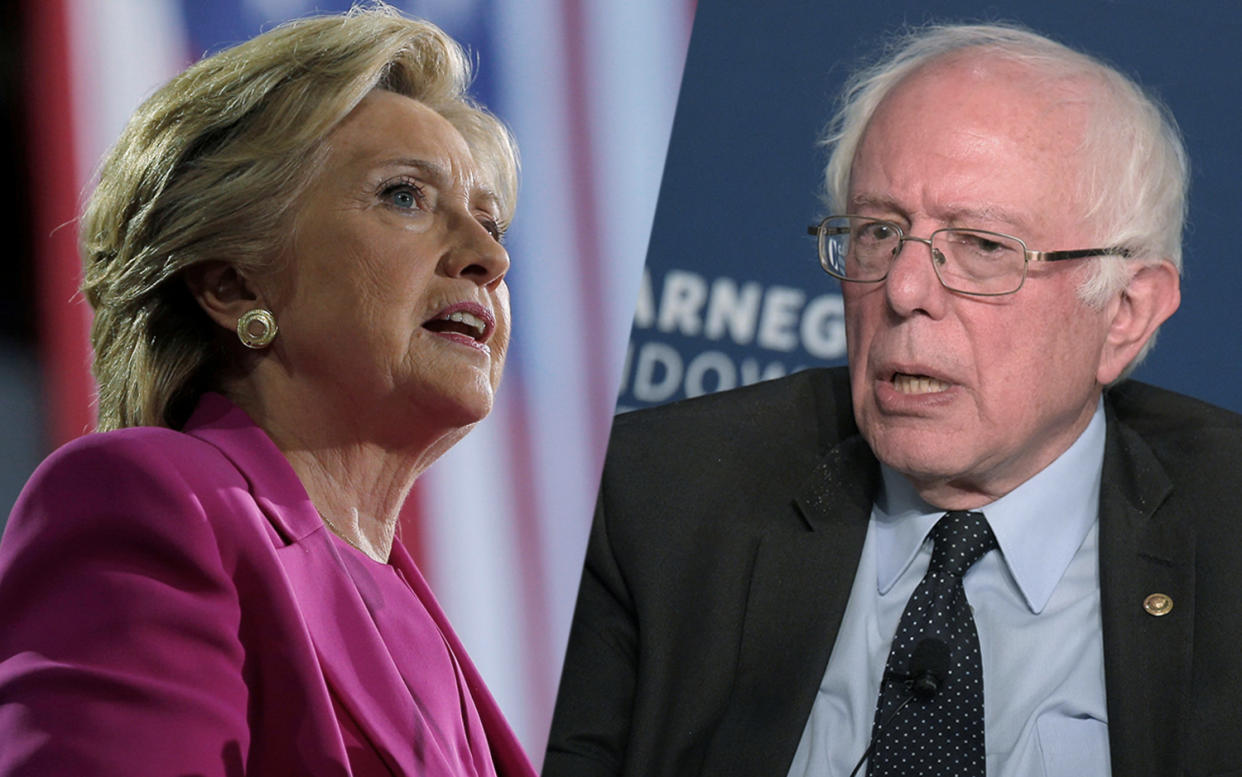'It hurt': Clinton says Sanders dragged out nomination fight

Hillary Clinton says Bernie Sanders’s reluctance to concede the 2016 Democratic presidential nomination before the party’s convention was disrespectful, hurtful and stood in stark contrast to the way she handled her primary loss to Barack Obama in 2008.
“I had such a different experience in ’08,” Clinton said in an interview with the “Pod Save America” podcast that was posted on Tuesday. “Once it was over, it was over. And I quickly endorsed President Obama. I worked really hard to get him elected. I was still arguing with my supporters at the Denver convention, telling people, ‘Don’t be ridiculous. You’ve got to vote for Senator Obama, at the time.’ And I was thrilled when he got elected.”
“I didn’t get anything like that respect from Sanders and his supporters,” Clinton said. “And it hurt. You know, to have basically captured the nomination, ending up with more than 4 million votes than he had. And he dragged it out.”
“I won, really, by March and April, but he just kept going,” Clinton told NPR’s “Morning Edition.” “And he and his followers’ attacks on me kept getting more and more personal, despite him asking me not to attack him personally. And, you know, I really regret that. But now he’s got a chance to prove he’s something other than a spoiler. And that is, to help Democrats. And I don’t know if he will or not, but I’m hoping he will.”
Sanders formally endorsed Clinton on July 12, 2016 — two weeks before the Democratic National Convention in Philadelphia — and campaigned for Clinton during the general election.
On the podcast, Clinton reiterated an argument she presents in her campaign memoir, “What Happened”: that the independent Vermont senator, a self-described democratic socialist, is not a true Democrat.
“Why would we be surprised? He’s not a Democrat,” she said. “And that’s not a slam on him — that is just a repetition of what he says about himself.”
In the book, out Tuesday, Clinton claims that the “attacks” Sanders leveled at her during the primary campaign “caused lasting damage,” made it harder to “unify progressives” and paved the way for Donald Trump’s “Crooked Hillary” refrain.
“I don’t know if that bothered Bernie or not,” Clinton writes. “He certainly shared my horror at the thought of Donald Trump becoming President, and I appreciated that he campaigned for me in the general election. But he isn’t a Democrat.”
“He didn’t get into the race to make sure a Democrat won the White House,” she adds. “He got in to disrupt the Democratic Party.”
Clinton also argues that Sanders’s presence in the primary prevented her from running a “feisty and progressive campaign,” especially in states like Pennsylvania and Ohio.
“We were certainly trying to run that kind of campaign,” Clinton said in the podcast interview. “His claims, which he could not defend — really not even explain when pressed — filled up a lot of space.”
A spokesman for Sanders did not immediately return a request for comment. Last week, Sanders told The Hill newspaper that he isn’t interested in rehashing the 2016 campaign.
“My response is that right now it’s appropriate to look forward and not backward,” he said. “Our job is to go forward.”
Clinton said her focus is now on “people who are proud to be Democrats, people who want to defend the legacy of Democrats, of our last president and presidents before, who have done so much to help so many Americans economically, in terms of human rights, civil rights” — and figuring out what the party needs to do to break through a “very difficult media environment.”
“The other side has dedicated propaganda channels — that’s what I call Fox News. It has outlets like Breitbart and, you know, crazy InfoWars and things like that,” she said. “In this particular election it was aided and abetted by the Russians and the role Facebook and other platforms played. We [were] late to that. We did not understand how a reality TV campaign would so dominate the media environment.”
Read more from Yahoo News:



